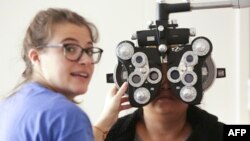The World Health Organization reports proper care could have prevented vision impairment or blindness in about half of the more than 2.2 billion people globally who suffer from these conditions. The findings were part of the WHO’s first World Report on Vision that was launched in Geneva in advance of World Sight Day Oct. 10.
The report attributes the increase in worldwide eye problems to an aging population, changing lifestyles, which are leading to a rise in type 2 diabetes, and limited access to eye care in low- and middle-income countries.
The World Health Organization reports people who live in rural areas, those who are poor, people with disabilities, and ethnic minorities are among those who suffer most from bad vision.
Technical officer in the WHO’s Prevention of Blindness and Deafness Department, Stuart Keel, says conditions such as shortsightedness and farsightedness, glaucoma and cataracts are about four times higher in the world’s poorer regions than in high-income regions.
“For instance, western and eastern sub-Saharan Africa have vision impairment rates [and] distance vision impairment rates that are eight times higher than all high-income regions. ... We know that about 60 percent of all vision impairment cases are found in three Asian regions alone, that being South Asia, East Asia, and South-East Asia,” said Keel.
The WHO says cataract surgery could prevent 65 million people from becoming blind. It says early diagnosis and treatment can improve conditions for many of the 76 million people suffering from glaucoma. And eyeglasses, it says, could vastly improve the eyesight of more than 800 million people who currently live with blurred vision.
Coordinator of the WHO’s Prevention of Blindness and Deafness Department, Alarcos Cieza, told VOA that research indicates that children who spend too much time on their electronics are likely to become visually impaired as they grow older.
“The major concern is that if children do not spend enough time outdoors and too much time indoors looking at their tablets and computers and these activities ... they will increase the probability of becoming myopic and also to increase the severity of the myopia,” she said.
Cieza warns that the more severe the myopia, the more difficult the treatment. Her advice: Children should spend more time outdoors kicking a ball around and less time indoors looking at tablets, television and computers.




